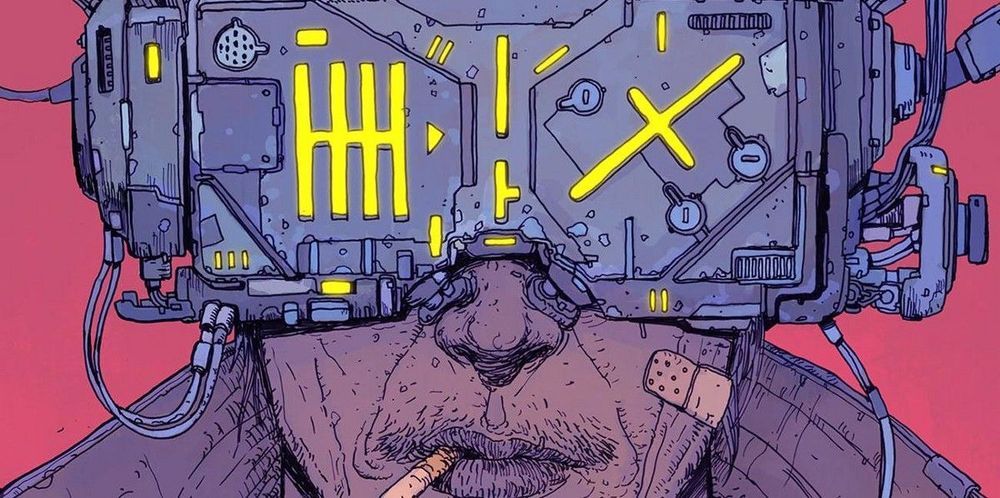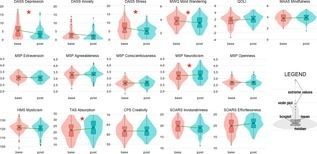Page 8144
Mar 3, 2019
SpaceX Crew Dragon hatch opening at the International Space Station
Posted by Mary Jain in category: space travel
Mar 3, 2019
It is time to take action and not let the current status quo stay the status quo
Posted by Michael Dodd in category: futurism
Mar 3, 2019
A systematic study of microdosing psychedelics
Posted by James Christian Smith in categories: climatology, health, law, neuroscience
The phenomenon of ‘microdosing’, that is, regular ingestion of very small quantities of psychedelic substances, has seen a rapid explosion of popularity in recent years. Individuals who microdose report minimal acute effects from these substances yet claim a range of long-term general health and wellbeing benefits. There have been no published empirical studies of microdosing and the current legal and bureaucratic climate makes direct empirical investigation of the effects of psychedelics difficult. In Study One we conducted a systematic, observational investigation of individuals who microdose. We tracked the experiences of 98 microdosing participants, who provided daily ratings of psychological functioning over a six week period. 63 of these additionally completed a battery of psychometric measures tapping mood, attention, wellbeing, mystical experiences, personality, creativity, and sense of agency, at baseline and at completion of the study. Analyses of daily ratings revealed a general increase in reported psychological functioning across all measures on dosing days but limited evidence of residual effects on following days. Analyses of pre and post study measures revealed reductions in reported levels of depression and stress; lower levels of distractibility; increased absorption; and increased neuroticism. To better understand these findings, in Study Two we investigated pre-existing beliefs and expectations about the effects of microdosing in a sample of 263 naïve and experienced microdosers, so as to gauge expectancy bias. All participants believed that microdosing would have large and wide-ranging benefits in contrast to the limited outcomes reported by actual microdosers. Notably, the effects believed most likely to change were unrelated to the observed pattern of reported outcomes. The current results suggest that dose controlled empirical research on the impacts of microdosing on mental health and attentional capabilities are needed.
Citation: Polito V, Stevenson RJ (2019) A systematic study of microdosing psychedelics. PLoS ONE 14: e0211023. https://doi.org/10.1371/journal.pone.
Editor: Danilo Arnone, King’s College London, UNITED KINGDOM
Continue reading “A systematic study of microdosing psychedelics” »
Mar 3, 2019
SpaceX’s Crew Dragon capsule successfully docks to the ISS for the first time
Posted by Michael Lance in category: space travel
Mar 3, 2019
Elon Musk says he would ride SpaceX’s new Dragon spaceship into orbit — and build a moon base with NASA
Posted by Montie Adkins in categories: Elon Musk, space travel
“We should have a base on the moon, like a permanently occupied human base on the moon, and then send people to Mars,” Musk said when asked what SpaceX will do after getting Crew Dragon operational. “That’s what we should do.”
He added: “Maybe there’s something beyond the space station, but we’ll see. We’ve got to focus on getting this right, for sure. That’s the priority. But then, after that, maybe something beyond low-Earth orbit.”
SpaceX rocketed its first spaceship for NASA astronauts into orbit on Saturday. Elon Musk, the company’s founder, said he’s willing to climb aboard.
Mar 3, 2019
The SpaceX #CrewDragon is in orbit, on its way to the International Space Station
Posted by Alberto Lao in categories: robotics/AI, space travel
Unlike the cargo Dragon, which is grappled by a robotic arm, this uncrewed test flight for our NASA Commercial Crew Program will dock autonomously.
Watch live at 3:30 a.m. EST to see a brand-new spacecraft’s first-ever arrival at the station: https://go.nasa.gov/2IPCG7P
Mar 3, 2019
What to Expect from The Twilight Zone Reboot
Posted by Derick Lee in category: transportation

Created by Rod Serling, The Twilight Zone aired for five seasons from 1959 to 1964. The science fiction anthology series entertained audiences with mind-bending narratives and clever twists — as well as some pretty scary stories. The iconic theme was composed by Bernard Herrman, who bookended his feature film career with Orson Welles’ Citizen Kane and Martin Scorsese’s Taxi Driver. In American pop culture, The Twilight Zone is synonymous with high concept television.
We break down everything you need to know about Jordan Peele’s reboot of The Twilight Zone.
Continue reading “What to Expect from The Twilight Zone Reboot” »
Mar 2, 2019
The good kind of fat
Posted by Paul Battista in categories: biotech/medical, neuroscience
Metastasis is the leading cause of death from cancer, occurring when cancer cells separate from the original tumor to proliferate elsewhere. These new cancer cells travel through the bloodstream or lymphatic system. Since these bodily systems are thoroughly connected, cancer can spread to a variety of locations. Breast cancer, for example, “tends to spread to the bones, liver, lungs, chest wall, and brain.”
Cancer cell plasticity — an ability that allows cancer cells to shift physiological characteristics dramatically — fosters metastasis and is responsible for cancer’s resistance to treatments. To combat its resistance, researchers at the University of Basel in Switzerland decided to turn cancer’s cellular plasticity against itself. They used Rosiglitazone, an anti-diabetic drug, along with MEK inhibitors in mice implanted with breast cancer cells. Their aim was to alter the cancer cells.
The drug combination hijacked the breast cancer cells during epithelial-mesenchymal transition (EMT), a process by which the cells undergo biochemical changes. EMT plays a role in many bodily functions, such as tissue repair. In unaltered cancer cells, EMT allows them to migrate away from the original tumor while maintaining their oncogenic properties.

















